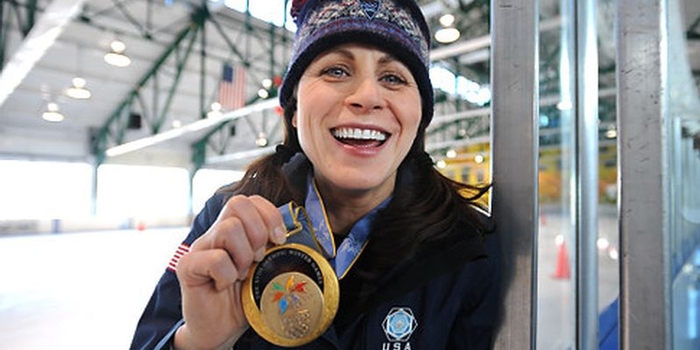Meet Women's Hockey Gold Medalist
![]()
February 2, 2022
Coach Highlight: Alana Blahoski

Photo Courtesy of the Daily News (Watts/News)
What a great week for women in sports. Today we celebrate National Girls & Women in Sports Day and the Winter Games 2022 kick off on Friday, We couldn't think of a better person to highlight than Chelsea Piers Hockey Coach Alana Blahoski. We spoke with Alana, a member of the 1998 Team USA Gold Medal Women's Hockey team about her experience in the Games and her advice for girls and women in sports today.
What is it like to watch the current Olympics having been an Olympian?
Watching the Olympics is exciting, and it brings back wonderful memories. I was fortunate to take in the Winter Games from several different perspectives; participant, member of the women’s Olympic ice hockey team (Nagano, 1998), NBC employee (Salt Lake City, 2002), Assistant Coach women’s Olympic team (Torino, 2006), and spectator (Vancouver, 2010). The Games themselves are intense and interwoven with human stories of personal triumph in just getting there, so it’s the Opening Ceremony, when the Games begin and the athletes march into the stadium behind their flags, that is the culmination of those personal efforts and for many, the realization of their Olympic dream. I love watching the Opening Ceremony.
How is Olympic competition different now vs when you competed?
I can only speak for the Olympic competition in women’s ice hockey. In some ways, it has changed very little with Team Canada and Team USA still being the top two teams in the world (they are the only National women’s hockey programs that compensate their players with a living wage and because of this there still exists great disparity among international teams). Olympic competition has changed with the tremendous growth of girls and women’s ice hockey in North America, and the World over the past 25 years due to media exposure and increased opportunities. More girls and women play now than ever before, and these athletes (like the male athletes of today) are bigger, faster, and stronger. There are opportunities to continue playing professionally after college, both domestically (Premier Hockey Federation, PHF formerly the NWHL) and internationally with professional leagues in Austria, Germany, Russia, Switzerland, and Sweden) making it easier for female players to stay in the game. The US Women’s national and Olympic games are televised on the NHL Network, and the rivalry between the American and Canadian women has earned its place as one of the best in all sports.
What did it feel like to go to the Games? What did you learn about yourself?
As a young girl, watching the 1980 US men’s Olympic ice hockey team win gold in Lake Placid, I knew I wanted to be an Olympian. I was a sophomore at Providence College when it was announced that women’s ice hockey would be an official medal sport in the 1998 Nagano Winter Olympics. Right then, right there, I decided I would be on that team. My hockey coach at Providence, John Marchetti, an incredibly optimistic and eccentric man gave me a book by author, Og Mandino. The book was about how to achieve one’s dream. I already possessed the physical part, hard work and ability, this book helped me learn the importance of the mental part, the power of believing in yourself. Two quotes from that book have always stuck with me, “Failure will never overtake me if my determination to succeed is strong enough” and “Always render more and better service than is expected of you, no matter what your task may be”
What advice do you have for girls and women in sports today?
There has been no better time than now to be a female athlete. With the fight of those long before me, many barriers to women in sport have been broken, and great opportunities created. Fifty years ago, Title IX of the Education Amendments Act of 1972 was passed. Title IX was federal equal rights legislation that required American society to recognize a women’s right to participate in sport for competition. It provided women with equal access to any program or activity that receives Federal financial assistance, including sports. As of 2020, there were approximately 222,920 female student athletes and 281,699 male student athletes competing in the NCAA. The International Olympic Committee (IOC) continues to recognize that “sport is one of the most powerful platforms for promoting gender equality and empowering women and girls.” We all need to encourage, support, and promote girls and women in sport.
To learn more about Coach Alana who coaches a variety of youth and adult athletes as well as NYC Cyclones youth hockey teams, click here.